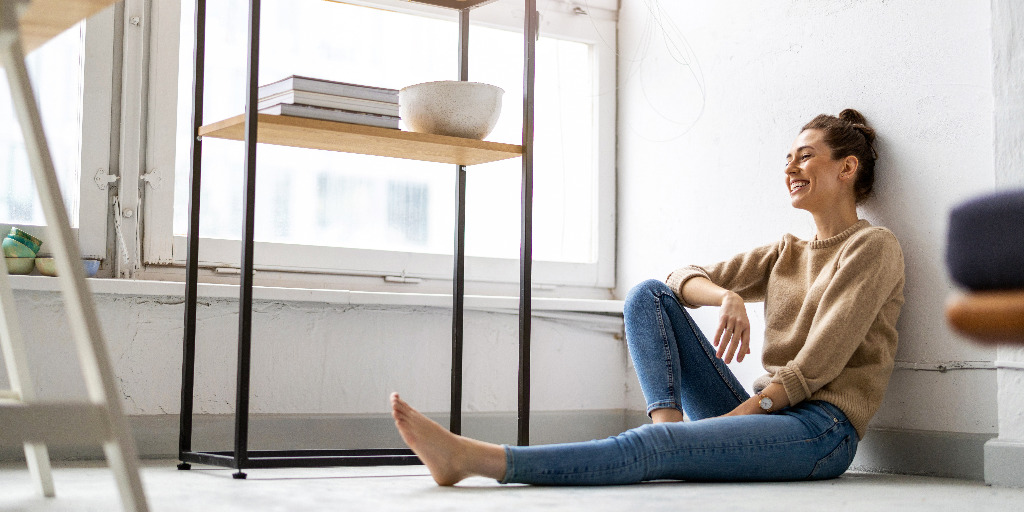Being able to afford living on your own is a major financial milestone, but it’s not easy.
While the average single American’s annual living expenses total $44,312, the average American full-time, year-round worker earns just $60,070, according to 2022 Census Bureau data. Accounting for income taxes, this hypothetical “average” American is just getting by, with zero margin for saving. (Data from 2022 is the most recent available. Given inflation, these numbers — especially expenses — are likely even higher in 2024.)
Sharing the cost of housing and other routine expenses with relatives or roommates is a considerable advantage that frees up income for both saving and discretionary spending. But sometimes, you just want space to yourself.
Chances are, in determining whether you can afford to move out, you’ve fixated on the monthly cost to rent an apartment — with or without roommates. And while that’s certainly going to be the biggest item list in your budget, there are plenty of other expenses you’ll incur by living alone that you need to take into consideration outside of just rent.
So, before you sign that lease and move out on your own, make sure you can afford all of these costs.

Housing costs
Rent
Depending on the cost of living in your area this could be hundreds or even thousands of dollars a month.
If you live in a major city you’ll probably need to get used to the idea of living with roommates. If you’re really against living with other people, get ready to pay a wild amount to live in something the size of a walk-in closet.
So, how much can you expect to pay?
Well, the median rental price of an apartment in the U.S. in 2022 was over $2,000. But that number varies wildly depending on your location.
For example, the median price on a one-bedroom in New York City is $4,300 as of November 2023, according to Zumper’s national rent report. On the opposite end, the median rent in a place like Oklahoma City is $880.
But no matter where you are, you’ll need at least double that to move in.

That’s because you’ll need to put down first and last month’s rent and, oftentimes, a security deposit. Sometimes your last month’s rent will be considered your security deposit, but not always. It really depends on the landlord and the rental laws of your state. Security deposits are typically around one month’s worth of rent, but in some areas, landlords may want up to three months’ worth.
So, if your Oklahoma City apartment goes for $880 a month, and your landlord wants first, last, and a security deposit worth one month, you’re looking at $2,640 just to move in.
And remember, you don’t want to sign a lease and be on the hook for a monthly rent payment without at least some emergency savings. You never want to fall behind on rent, but you certainly don’t want to do it within the first few months of living there!
Heating
Whether or not heat is included in the rent depends on the type of heating you have. If you don’t control the heat in your apartment, it’s likely the cost of heat will be included.
But if you control your own heating, you’ll have to pay out of pocket. And unfortunately, with the current spike in energy prices, you could be paying a lot.
Radiator, gas, or forced air heating can cost up to $100 a month depending on the efficiency of your apartment.
Water
Sewer and water have risen over the years and, on average, a family of four pays about $40 per month as of December 2023. A one-person apartment will obviously cost substantially less.
If water is included in your rent make sure you clarify that this covers sewer, cold water, and hot water.
Electricity
Your electric bill will likely be the highest of your utilities, ranging from around $40 to potentially over $100 depending on the size of your apartment and how often you have your lights on, use the television, use appliances, etc.
If you’ve got an efficient apartment and use fluorescent compact light bulbs (what used to be the spiral ones) your bill may be a little lower than the average.
Air conditioning in the summer and heating in the winter (if it’s electric) will drastically increase your electricity bill by $50-$100.
Gas (for the stove)
Older apartments still require you to pay for natural gas for your stove, but the price shouldn’t be too high. It’ll only be about $15 a month, depending on how often you cook.
Washer/dryer
Some apartments come with a washer and dryer in the unit, but often you’ll have to go to a laundromat or a shared laundry room in the building.
If you wash and tumble dry your clothes every week you’re likely spending $4 or more dollars per load, which can cost you a couple hundred dollars a year.
Renter’s insurance
Here’s a harsh truth that many people don’t know: when you rent an apartment, your landlord’s insurance doesn’t protect you from anything. If the building burns down, nobody is going to compensate you for your stuff. Worse, you’ll be out of a place to live.
Fortunately, there’s an easy (and relatively inexpensive) fix: renters insurance.
For a couple hundred dollars a year, a policy from one of the best renters insurance companies insures your belongings from theft and damage and may provide compensation to help you move if your apartment becomes uninhabitable.
We know you’re probably going to decline (or forget about) renter’s insurance unless you have to. (Note that some landlords require you to have renters insurance as a term of the lease.) Most renters take their chances and hope their apartment building won’t burn down. But renter’s insurance is an expense you should really consider. The $15-$30 a month payments could save you a lot of money and a lot of heartbreak.
Set-up costs
Furniture

Rarely do apartments (at least affordable ones) come furnished, so that’s another large expense you’ll have to consider.
You’ll want to save some money to purchase a couch, mattress (if you don’t already have one), chairs, a dining table, a TV and TV stand, etc.
You can get a lot of these items at thrift stores or big-box stores like Target and Walmart for fairly cheap. Make sure, if you’re buying a mattress, you buy a new one. Used mattresses are rarely worth the deal and potential headache.
Cookware
Of course, in order to cook your own food, you’re going to need tools to cook with. Luckily you can find cheap plates, dishes, cups, pans, and more at Target, Walmart, or even thrift stores (Goodwill often has gently used kitchen sets for cheap). Alternatively, ask some family members if they have any they’re not using or plan to throw out.
Appliances
Almost all apartments come with a refrigerator and an oven, and some even come with microwaves, so these aren’t something you should be too concerned with.
However, if you manage to find an apartment that doesn’t have an oven or stove (probably an apartment that’s heavily discounted), you should definitely consider getting a microwave — that way you at least have something to cook with. You can probably get a small microwave for around $60.
Day-to-day living expenses
Parking and/or public transportation
Parking can be hard to come by in large cities. In smaller cities (like Portland, Maine, where I live) you can sometimes get away with parking on the street, but you could end up paying a heavy fee for snow ban parking, or parking tickets if you don’t move your car frequently enough.
If parking doesn’t come with the rent or is not on-street, you could pay upwards of a couple hundred dollars for lot or building-related parking.
Food
Don’t forget, when you move out you’re leaving the comfort of college food (no matter how bad, at least it was something you didn’t have to think about) or your parent’s food.
If you haven’t had to consistently pay for your own groceries, you probably don’t realize how much it costs per month. And that doesn’t include eating out.
According to the USDA ranges, a low-cost food plan is between $250 and $300 per month. If you shop less frugally (say, buying brand-names instead of store brands or pricier items like better cuts of meats, cheeses, and exotic produce), expect to pay anywhere from $300 to $450 per month.
» MORE: How to cut your grocery bill by 90%: Is it possible?
Toiletries and cleaning supplies
It costs money to keep your apartment (and yourself!) clean. Shampoo, toilet paper, dish detergent, bleach, and all those other things can add up fast, especially if you’re starting from scratch.
The cost of these expenses will of course vary depending on the types of products you choose, but expect to spend roughly $50 per month on these supplies.
Cable/internet
If you’re really lucky your apartment will come with cable and internet included in the rent. If you’re somewhat lucky it’ll at least include WiFi, but if not you’re going to have to pay that bill. Internet tends to average about $50 a month depending on the provider.
You might want to skip the cable if you’re on a budget. After all, you probably have Netflix, Hulu, and access to a sports bar with happy hour pricing, so who really needs cable?
Personal expenses
There are a lot of expenses to consider just for your apartment, but don’t forget about all your other expenses as well.
When figuring out how much you can afford, factor in your debt payments (student loan, credit card, etc.), car insurance payments, medical payments not covered by insurance, an emergency fund, and money to spend on your nights out.
» MORE: How to manage student loan debt
Total cost to live alone
To give you a quick overview of the total cost, I’ll break down the cost of the apartment I moved into.
- Rent (includes heat, water, sewer, and parking): $1,300, plus a $1,300 security deposit at move-in
- Electricity: $50 a month
- Netflix + Hulu Subscriptions: $18 a month (has gone up since)
- Food: I shop weekly and spend around $80, so that’s about $320 a month
- Furniture: I got a lot of furniture off of Craigslist and recycled from friends and my parents, so in total about $300 for all my furniture (this is not usually the case, I got lucky and didn’t have to spend a lot!)
- Laundry: Laundromats in my area cost about $6-$8 for washing and drying one load of laundry
- Transportation: About $30 every two weeks, or just more than $60 a month
Total: $3,380 for the very first month, and about $1,730 every month after (not including personal expenses, toiletries, etc.).
How to budget for living alone
Moving out on your own comes with so much freedom, but also a ton of responsibility. When you’re shopping for new cookware and picking out paint samples, it’s easy to get swept up in the fun of it all — and forget about things like making sure your utility bills are paid on time.
Here’s how to make sure you don’t fall behind and into trouble:
1. Know your expenses
Even before you move into your new place, it’s important to sit down and work out a budget. This is where some options like the best budgeting apps can come in. You should include all of your expected fixed expenses like rent and utilities in this budget — as well as other things such as food, transportation, insurance, etc.
When it comes time to pay your bills, make sure rent is always at the top of your list — you don’t want to get evicted for not paying your rent on time!
2. Set up automatic payments
If you tend to be bad with dates or just don’t want the hassle of remembering, set up automatic payments wherever you can. With automatic payments, you’re telling the bank to transfer a certain amount of money to a vendor, on a specific regular date (e.g., the 15th of every month, or every second Tuesday).
Then, on those set dates, your bill payment will be processed without you having to do a thing. Easy-peasy.
However, two very important notes:
- Automatic payments only work for fixed costs that don’t change from month-to-month — like your cable/internet bill versus, say, your heating bill.
- You must make sure you have the money in your account for when payment day rolls around, otherwise you’ll be slapped with an insufficient funds fee by your bank, and start getting charged interest by the vendor.
3. Know when to say no
We get it — when you’re living on your own for the first time, in a new city, it’s easy to blow through your budget on dinners out, daily treats like lattes on coffee shop dates, and drinks with new friends.
But a big part of living on your own is knowing when to curb the spending. Be strict with yourself. If rent is coming up and your bank account is looking low, maybe invite your friends over for a Netflix night in rather than hitting up a new restaurant and paying the cost to eat out, at least for now.
4. Control what you can
While your rent is going to stay the same price every month (although it will likely increase year-on-year), things like your electricity and heating will vary based on how much you use them. (Assuming they’re not lumped in with your overall rent.)
If your parents were always reminding you to turn off lights or to go easy on cranking up the heat, now you’ll understand why. Those bills can add up fast if you’re not careful.
You may want to keep the temperature just a bit cooler and wear slippers rather than walking around barefoot in the winter months, to keep your gas bill down. Or you could hang-dry your laundry rather than using the dryer to half your weekly laundry costs. Control the costs you can.
5. Make your living expenses work for you
Sure, all those bills you’re now paying give you the roof over your head and the food in your fridge, but you can also make them work for you beyond that.
You could opt to put recurring bills like heat, water, and electricity onto a rewards or cash back credit card. If you do this, remember to pay the balance off every month.
With the best cash-back rewards credit cards, you’ll get a percentage back on purchases you make with the card, which can then be redeemed for statement credits, gift cards, etc. So, if you put all of your utilities and groceries onto the card, you’re getting money back on bills you are paying anyway.
Other cards, like the best travel rewards credit cards, offer you travel benefits like air miles so you can fly home for less or take an end-of-year vacation with the miles you’ve racked up. You can do this for any recurring payments including your gas station visits, grocery shopping, and regular school supplies.
But again, we can’t stress this enough: don’t forget to pay the balance down every month, or you’ll be forking over interest on your monthly bills, which can cost you hundreds or even thousands of dollars in the long run.
Lastly, you can also use your bill and rent payments to boost your credit score.
Only certain payments are counted towards your credit score (credit card payments, loan payments, etc.). But there are services like Experian Boost™ that report your utility payments and cellphone payments to the credit bureaus. If you have low (or no) credit, this can be a good way to build up your score.
The bottom line
Living on your own for the first time can be both exciting and scary. It can also be expensive. The median rent in the U.S. can range from nearly $4,000 at the high end to under $800 on the low end. And then there are security deposits, utilities, furniture, food, renters insurance, and more to think about.
But you can manage your living expenses by budgeting, setting up automatic payments, knowing when to say no to unnecessary spending, and controlling what you can (like your utility costs). With a little planning and mindfulness, you can make sure that your living expenses don’t leave you in a financial bind.

